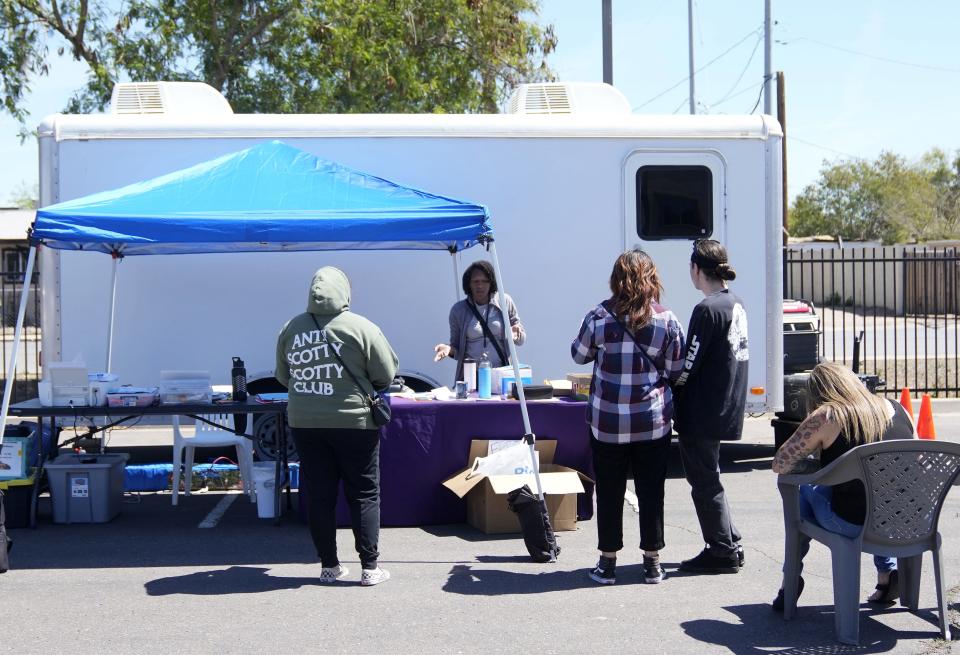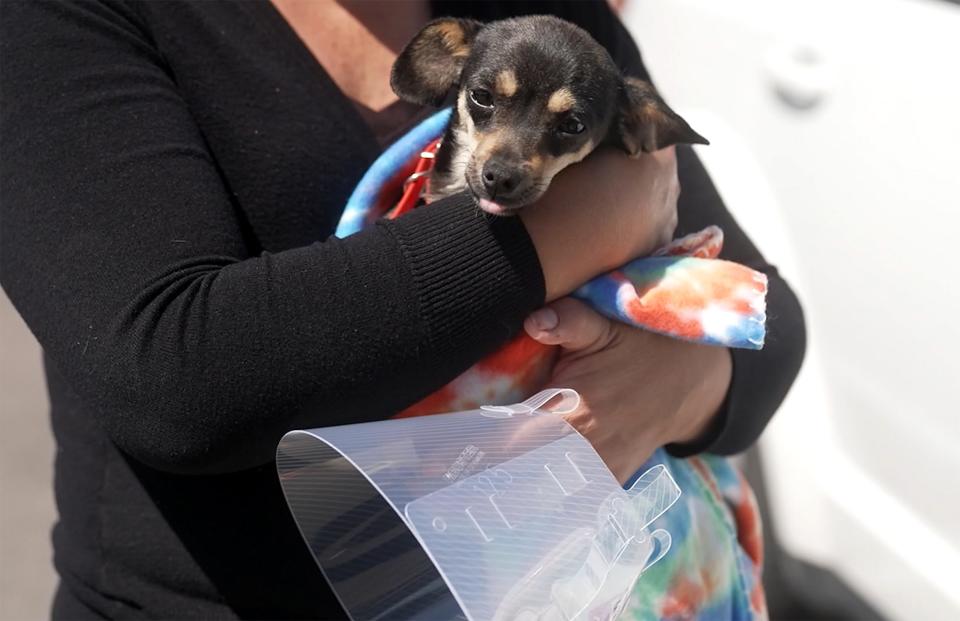Maricopa County expanding mobile pet clinics to reduce stray population, shelter numbers
The parking lot outside the evangelical church at Polk Street and 29th Avenue would normally be quiet on a Friday.
But on March 31, it saw steady traffic as neighborhood residents approached a large white trailer. They came with dogs and cats in tow — and sometimes, in their arms.
Inside, a veterinarian team from Preferred Pets Vet Clinic was working to spay and neuter the animals. Heart monitors attached to dogs and cats beeped incessantly in the cramped space as three people worked to prep, medicate and alter the pets. The orderly buzz of activity was interrupted only by the opening of the trailer door as aides took pets in for appointments and out to be reunited with their owners.
"We start at 7:30 for our first check-in, and by noon, we like to have 20 done, if possible," said veterinary tech Paula Motyka amid dosing out anesthetic drugs and shaving animals to prepare each one for their procedure.
The mobile clinic is part of an ongoing effort by Maricopa County Animal Care and Control to fight overpopulation in its shelters. Once a month, the department uses grant money to pay for an equipped and staffed trailer to park in one of the Valley's ZIP codes that see the most stray animals coming into the county's shelter system. During each session, the staff will alter 30 to 40 animals free of charge for their owners.
County employees are betting that if more pets are fixed, the stray population in these areas will decrease over time, and fewer animals will end up at the kennels. With that goal in mind, they're poised to begin offering clinics more often with a new funding source: $1 million of COVID-19 recovery money from the federal government.
"The historic best practice to reduce the surrender numbers is to alter the animals in the specific areas," staff wrote in a justification form for a contract with one of its mobile clinic vendors, Fix-Adopt-Save, filed with the county's Office of Procurement Services. "Historically, it has been shown that when mobile clinics have offered these services for no cost ... within three years the surrender rates have dropped up to 60% from these areas."
In total, the county's shelters can comfortably hold 500 dogs, said spokesperson Kim Powell. During the work-from-home era of the pandemic, staff saw record lows in stray animals. But in recent months, there's been a sharp uptick, and the kennels have regularly been over capacity with more than 600 dogs.
Nearly 18,500 animals entered the department's care last year, and at times, the staff has been forced to turn away animals because of a lack of space.
"Over the last year or so, we started to see more animals coming in," Powell said at the mobile clinic. "I believe today we only have six available kennels at our West shelter. That number changes all the time, but sometimes, and oftentimes, there are more animals coming in than going out."
In October, the county's East Valley shelter also saw an outbreak of distemper, a highly contagious viral disease that can cause coughing, decreased appetite and vomiting in dogs. It can be fatal. Staff had to temporarily quarantine all of the animals in the county's kennel facilities. Ultimately, 240 animals were infected, and several were euthanized to stop the spread. That ignited criticism from animal advocates, who accused Animal Care and Control of failing to protect and properly manage dogs in its care.
Amid that tension, Animal Care and Control saw the departure of director Michael Mendel, who left his role after several employees alleged he bullied and berated them during an emotional outburst over criticism of the department.
So, officials said, relief from the constant influx of strays is sorely needed.
"We're seeing more puppies and kittens, and we're trying to change that," Powell said.

Where are strays coming from?
Animal Care and Control tracks where stray animals are picked up before being brought to the county's shelters.
The top ZIP codes where dogs and cats are found include:
85009, which covers most of West Phoenix.
85041, which encompasses parts of South Phoenix and Laveen.
85326, which covers much of Buckeye and areas of unincorporated Maricopa County in the West Valley.
85323, which includes parts of Avondale.
85339, which stretches from Laveen to Highway 347 and includes parts of the Gila River Indian Reservation.
85048, which encompasses parts of Ahwatukee and the Gila River Indian Reservation.
85040, which covers several South Phoenix neighborhoods.
85042, which includes parts of South Phoenix near South Mountain.
85035, which runs along I-10 in Maryvale.
85033, which includes several areas in Maryvale.
Until now, the county has largely focused on tackling the problem through mobile clinics in the 85009 and 85041 ZIP codes, where they see the most strays. The department has limited resources, officials said, and they face a shortage of vet providers.
Meanwhile, most private veterinary practices are booking spay and neuter appointments months in advance. Those procedures can cost $300 to $600 per pet, depending on the size of the animal, said the team with Preferred Pets Vet Clinic.
The new federal money will allow the county to hold mobile clinics more frequently and update its contracts with private veterinary partners to be more competitive, giving more pet owners from the targeted ZIP codes the chance to have animals altered at no cost.
Lucy Amaya, 33, lives five blocks away from the church where the county booked its March appointments. She arrived at 11 a.m. sharp to get her nearly-year-old puppy, Pumpkin, spayed. Amaya said she wouldn't be able to afford the procedure without the mobile clinic.
She also can't afford a litter. Amaya said her mother has a dog, 6-year-old Sujey, who gave birth last year to 12 puppies, including Pumpkin. Amaya and her family had to find people to take them off their hands, and she said she doesn't want to go through the experience again.
"It was hard to find ownership for them," she said. "We put them on Craigslist, and we just sold them to whoever was able to take care of them."

Mobile clinics a vehicle for owner education, other pet care
The mobile clinics only offer spay and neuter services for free. But the clinics are a good opportunity for Maricopa County and veterinary staff to educate owners and address other problems, too.
Some animals, including Pumpkin, had fleas and ticks and were sprayed down with Frontline treatment. Amaya and other owners were given the option upon pickup of purchasing treatment to help protect their pets from the pests going forward.
Others got their animals vaccinated and microchipped for an extra fee. The county also often holds grant-funded events where similar services can be accessed at reduced or no cost to pet owners.
Microchips in particular can help get pets home faster and keep them out of the shelters, Powell said.
Methods for identifying animals are especially important in the summer, she said, when shelter overcrowding gets worse because of monsoon storms, holiday fireworks and intense heatwaves.
The Arizona summer brings loud noises and lights that can spook animals, leading some pets left outside in poorly fenced areas to run away and get lost. Plus, wild winds can blow down fences and walls, allowing for unexpected escapes.
"We are running out space," she said. "Especially as we head into the summer season."
Sasha Hupka covers Maricopa County, Pinal County and regional issues for The Arizona Republic. Do you have a tip about county government? Reach her at [email protected]. Follow her on Twitter: @SashaHupka.
This article originally appeared on Arizona Republic: Maricopa County expanding mobile pet clinics to aid shelters, owners